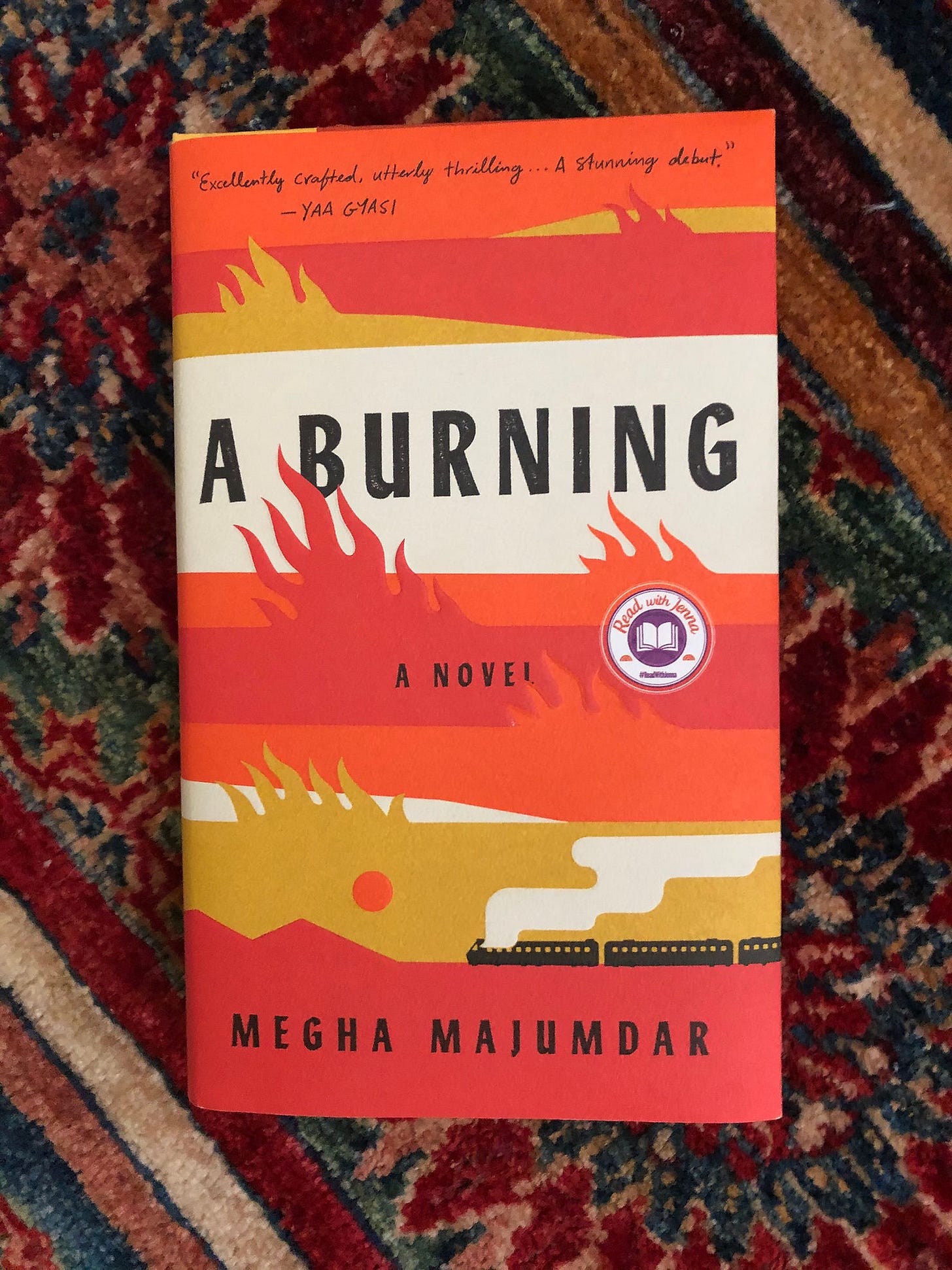Review of A BURNING
A novel for our moment
The Covid 19 days have moved slowly and awkwardly. Reading remains an anchor though the first month or two I found myself unable to give myself permission to read. It felt like too much was at stake. It felt a bit too much like Nero and his fiddle. Soon, however, big history books became their usual breakwater for me and the stack began to grow next to my bed. However, there were no novels. I tried classics, collections of short stories and Southern California noir mysteries. All failed … until now. Thank you James Wood and Ravi Agrawal. The former is, I believe, our finest book critic. He writes for The New Yorker and has done so for a long time. His numerous collection of essays on the great writers, past and present, are required reading for serious literature fans. While I do not agree with him all the time, I always respect his opinions. The latter is my talented son-in-law, the Managing Editor of Foreign Policy magazine and the author of the widely acclaimed India Connected – which, in an openly nepotistic moment, I highly recommend. Its timeliness and insights are gifts that keep on giving. Anyway … back to the elusive novel. Both of these men wrote long and engaging reviews of A Burning by Megha Majumdar. It is her first novel and she apparently hit it out of the big lit park. That was enough for me. I just finished it and, yes, it is a serious book for this time and moment. The characters are compelling. They evolve (or devolve) as the circumstances of modern India absord their lives’ arcs. It is not long. It is beautifully structured. It might be ghe book of the year. Then again, it IS my first novel of 2020 s what do I know. With that in mind, I give you excerpts from James and Ravi as inspiration.
It’s only at the end of this brief, brave novel that one becomes fully aware of how broad its judgments have been, how fierce and absolute its condemnations. Through the gaps that open up among and behind these three characters, a large Indian panoply emerges. The book’s surface realism—that great boon to writers—is abundant and busy and life-sown: muri wallas, pillow-fillers, guava sellers, a man who grinds tobacco in his palm, not to mention theatrical agents, schoolteachers, hijras, criminals, and criminal politicians. But the system that at once supports and undermines this diverse vitality is seen with an unrelentingly cold authorial eye, in all its small and large corruption, its frozen inequality, murderous racism, political opportunism, and unalleviated poverty.
James Wood
The New Yorker, 6/8/20
One reason why A BURNING should appeal to readers unfamiliar with India is that the novel is not just a critique of modern Indian society but a universal parable on inequality. Systems promise much but turn out to be broken. Social mobility is exposed as a myth. Hope is an illusion. Rage is only natural. Jivan’s story of betrayal by the country of her birth could resonate to some extent for Black Americans, as protests over the killing of George Floyd have lighted up the world’s cities.
A BURNING will attract critics, especially in India, who will say its portrayal of the country is too bleak. And they will have a point. For all its flaws, India has more resilient checks and balances—and at least some redeeming features—than the novel lets on. The country’s legal system, for example, would almost certainly have moved Jivan’s case to a higher court for greater scrutiny. And its civil society, which has displayed a heartening resistance to government overreach and social injustice in recent years, doesn’t get a mention. In that sense, Jivan’s story can seem a bit contrived. But the role of the novelist is to take artistic license, to not just describe how things are but warn how they could be. That’s what makes A BURNING such essential reading. If Majumdar has tapped into the fury of the moment, it’s because her novel brilliantly explores some of the sources of the helplessness so many people currently feel. And we must listen to those people, because for many of them, the only way forward seems to be to burn it all down.
Ravi Agrawal
Foreign Policy, Summer 2020
A BURNING
Megha Majumdar (2020)
289 pages


